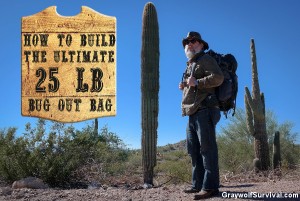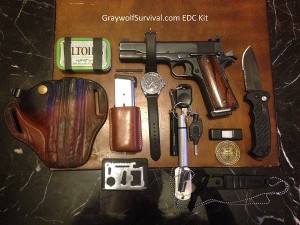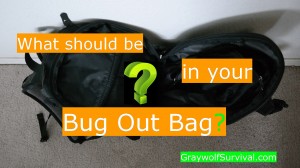
Prepping is important. Over-prepping can be as bad as under-prepping; both for learning and stocking supplies. The problem is that you can’t have everything and you don’t have unlimited time to learn everything. ‘Why not?’ you ask? How do you know when you’re prepping enough – or too much? Well, that’s what today’s article is about: over-prepping.
When I hear or read about some guy who’s amassed 20 years of food supplies for a family of 3 and see that a huge chunk of his stores won’t last 3 years, it drives me crazy, because it makes him look crazy – and in a way, he is. When I see people spending $1,200 on a jacket that works as well as one that costs less than $200 (and sometimes even better examples), I think of what else he could have bought with that money. BTW, those jackets are just for examples to prove a point – I’m not saying you should be buying either of them.
Doomsday Preppers is pretty good at finding borderline loonies and putting them in the worst light. Great to get the word out about preppers but when we try to discuss the real threats that are out there in the world, it makes the friends and families of the rest of us look at us like we’re telling them about the anal probes we’ve been getting from the Omazarkian Delegation of Transmark 5. Some of the websites I’ve been reading out there aren’t much help for our reputation.
Don’t get me wrong, not every person that’s on that show, and not every prepper blog I read is out there. Some of them have some absulutely fantastic information, and I learn something new every day. One thing that I’ve been seeing a lot lately is about over-prepping.
Opportunity cost
There’s a simple idea you need to know, that is the basis of the whole point I’m trying to get across. It’s the idea of opportunity cost. I’ve mentioned it before but over-prepping is where it really comes into play.
The basic idea is that if you choose one thing, you’ve essentially NOT chosen something else. On some level, every resource has some measure of scarcity. If you have one television and no way to record, you can’t both watch Dr Who and Firefly if they come on at the same time. You have to choose one. I’d personally choose Dr Who because I hate Firefly but this is an example that you people might choose, not me.
You only have so much room in your bugout location, can only carry so much weight, can only eat so much food before it expires and can only spend so much of your time learning or practicing. You also, only have so much money. When you choose to spend $10k on 10,000 cans of beans, you’ll definitely have the market cornered on beans. If you ate one can every single day, you’d have over 27 years of beans to eat. Considering a can of beans lasts probably 5-10 years, (let’s use 10 so I don’t have to use a calculator), that’s over 17 years of beans you’re going to be throwing away if you don’t have two other people with which to share said beans. In addition to the lack of dietary diversity you need to consider, eating something that often is gonna drive you crazy.
Also, let’s assume a can of beans is about the size of a beer can. The size of a beer can is about .21 cubic feet. If you consider a 24′ semi truck holds 1,350 cubit feet of space perfectly utilized (24×7.5×7.5=1,350), and 10k cans take up 2,100 cubic feet, you’d need 2,100/1,350 or 1.5 semi-trucks just to hold those cans.
So what does all this have to do with opportunity cost? That’s 1.5 SEMI TRUCKS FULL OF BEER THAT YOU COULD HAVE BEEN HOARDING INSTEAD OF FREAKING BEANS! See what I mean now? And you thought you’d never need that math they taught you in school all those years ago.
Utils
This concept is a bit strange for some who haven’t spent their time at Kappa Epsilon Gamma parties but the concept of utils is very useful to know here. There are a lot of highfalutin ways (did you know highfalutin was one word? I didn’t until just now) to define a util but it’s basically some kind of measurement as to the utility of something. Kind of. My brother would correct me here and tell me that a util is actually an indirect measurement as to how much someone would pay to satisfy some kind of need or desire but that makes it a bit difficult to translate into something useful. Google it if you want to learn more about utils but remember that the time you spend googling utils is time you’re not here reading my blog. Getting the point?
To make a util useful (don’t start getting all meta on me here and try to figure the utils of the concept of utils), think of is as a way to put some kind of overall value on something that isn’t necessarily a dollar amount. A util is basically a simpler way to put some kind of measurement of usefulness to something and how much it’s gonna do something that you need done. It’s not just that thing-A takes up 1 cubic feet and you have 100 cubic feet of space in your living room so you could fit 100 thing-A’s in your living room. WTF are you gonna do with 100 thing-A’s?
BTW, if you really want to learn about some of the concepts in this article, they’re spelled out very well in any decent book on economics.
What is over-prepping?
So, first of all, what is over-prepping? In the strict sense of things, overprepping is learning something or carrying/stocking something that you don’t end up using. It’s also when you buy something with way more bells, whistles and shiny things than you ever need. Don’t get me wrong, having the Nimbus 2000 is a great thing, but unless you have an unlimited supply of cash and money, and have a TARDIS to put it all into, you can’t think that way. Ok, so I threw in a couple of geek examples in there. If you caught them, you’re as much a geek as I am.
When you’re Ultralight Backpacking, every single item you carry will have an immediate effect on you because you only have so much room in your pack. When you’re deciding what goes into your bugout shelter or deep freezer, it’s not so obvious when you’ve put away too much.
Learning
Any good prepper knows that skills weigh a lot less than supplies, and take up less than half the space. The problem is that there is a LOT you can be learning and you don’t have an unlimited amount of time to learn it. Even if you were immortal like me, you only have the time from this moment to the time you need to use your knowledge to learn it. You don’t have forever.
You need to prioritize what you learn and how deep you learn it.
Learning to start a fire with only primitive materials is an extremely useful skill to have in certain circumstances, and the more you know about it, the easier it’s gonna be to warm up on the side of a hill when you’re camping with your girlfriend and trying to look like you’re more than just a pretty face. However, if you spent every waking moment for the next year learning how to start a fire from every example that’s ever been documented, and then practicing each of those methods, you may be really good at starting fires but not good at too many other things. Besides, girlfriends aren’t too keen on boyfriends obsessing on anything but them. You may enjoy sitting in smug satisfaction as you bask in the crackling glory of your accomplishments despite the damp surroundings, but there’ll be no one there to enjoy your overly-skilled prettiness.
Also, learning a tiny bit of a crapload of stuff, and not learning it well enough to make use of it is at least as bad. This happens when people do a lot of reading and not a lot of doing. Take some time to get out from behind the computer you’re reading this from and practice some of the things you’re learning. Then you’ll start seeing where your deficiencies lay. (I’m pretty sure it’s lay and not lie in this sentence but my brother will let me know if I got it wrong. He’s good at that stuff).
You need to look at what you’re trying to prepare for, and what situations you’re likely to find yourself in. Then start putting yourself in practice scenarios (camping, shutting off your power, etc) and see how close you are. Take inventory of the skills that may be required and where your skill levels are at each. One great way to learn is to teach. Assign a skill to each family member to learn and have that family member teach the others. If you don’t have a family, hire one. I guess you could use your friends though.
Buying
If you have enough money to buy 10,000 of the best of everything, and have a planet of your own to put it all, then you don’t really need to prep anyway. Just hand your computer to the guy you hire to do your prepping and let him continue to read.
It goes without saying that if you only have $100 and spend $100 on Ultra-man action figures, you can’t buy anything else. Over-prepping can be a bit more subtle than that.
So, since you’re still reading, I assume you don’t have an unlimited budget. Good. I don’t like ‘those people’ reading my blog anyway. Makes me feel inferior. Since you’re like me, you need to decide what you need to buy, how many of those widgets (my brother would call them widgets, even though they’re not widgets), and what quality of widget you need. You also need to look at what kind of features and benefits each widget should have. Make sure you know the difference between a feature and a benefit btw, drives car salesmen crazy when you point out that they’re using the wrong term. It’s not just that if you buy one thing, you can’t buy another; if you buy too good of a thing, you’ve chosen not to buy something that would cost less but still satisfy your needs/wants, thereby not leaving you money to buy more of them or something else in addition.
An example here is one I learned from Six Sigma years ago. As much as I hate six sigma, the example is pretty good. If you were to design an airplane (or in this case, buy an airplane) that could land with a precision of .000000001 inches, but had a 262 foot-wide runway on which to land, you’ve gone overboard. Considering whatever calculations you decide to figure out how precise your landing should be, you shouldn’t be more precise than that. The same goes for buying things. You need to find out what your widget needs to do for you, find one that does just that, and no more.
Obviously, this means all else is equal. If you find that there’s an equivalent replacement that will do 10x what something else does, costs less, weighs less and takes up less space, then you need to buy it. And maybe start selling them. In this case, the utils need to be adjusted a bit here.
Carrying
When deciding what goes into your bugout bag, you need to realize that you not only have only a certain amount of space, you can only carry so much weight. If you fill your pack, then every item you choose means there are a lot of other items you chose not to choose. Even deciding to not fill your bag means that the empty space you chose is at the cost of items you could have put there.
I wrote previously on choosing double-duty gear to save weight. If you can replace two or three things with one that works just as well, you’ll save space and weight in your pack. Just remember that two is one and one is none so don’t always choose a single item that does everything at the expense of having some measure of redundancy.
This redundancy is the core of what I’m talking about here when over-prepping. It’s all well and good to have multiple ways to make a fire, but if your pack is filled with 20 lighters, 10 magnifying glasses, 5 fire pistons (which look awesomely cool btw but I’ve never used one), and 10 packs of waterproof matches, have you overprepped for firestarting? If you end up not ever using every one of those, you’ve over-prepped. If you end up using every single one of those, losing them, or they’re not effective at the time you really need to start a fire for whatever reason, you haven’t prepped enough. You have to have the right balance of redundancy and decide that you have enough items, to solve enough problems given many different scenarios, and not one item more.
This is definitely a judgement call here. I’m not saying that it’s clear-cut when you have too much of something. Just look at your available resources (in this case, space, weight and money), and prioritize each item based on its utils.
The Law of Diminishing Returns
The Law of Diminishing Returns is what you use to help you figure out if you really need 10,000 of something. Basically, this “law” is better described with an example.
How much is a lobster dinner worth to you? By ‘worth’, we should be using utils because we learned them here today, so I should say, how many utils are in a lobster dinner? Let that value sink into your vertebrae for a moment and then think how many utils a lobster dinner would have to you after you just finished a hot dog eating contest. The market value of that overpriced lobster dinner (trick comment there for those who catch it), may be the same in both cases, but the utils will be less. A lobster dinner after eating 23 hot dogs wouldn’t satisfy as much of a need or a want as it would if you’d just gotten rescued from the side of a mountain after a week of camping with your screaming girlfriend ex-girlfriend without a fire and no food if you didn’t prepare properly.
In the same regard, one can of beans has a certain amount of utils associated with it. Buying a second can most likely has the same amount of utils as long as you’d eat it at some point before it goes bad. At some point, however, your util-calculation method may include the satisfaction that you get from eating beans and may start diminishing. After the 8,435th straight day of bean-eating, those beans aren’t looking so good now. If you’d read my article before you went on your bean-buying spree, you might have mixed it up a bit and gotten some corn and other items.
The same thing goes for redundancy in what you pack. You absolutely need to have more than one way to make fire, more than one way to filter water and so on. You just need to balance ALL your forecasted needs. Also, you need to balance your time as well. One hour of learning how to build a fire may be very useful at some point. 10 hours of learning and practicing may be even more beneficial and may even save your life someday. The thousandth hour of learning, however, isn’t going to be worth as much as the first 10.
Knowing when enough is enough
Take some time to evaluate what you need to prep for and what you’ll need to learn, plan, practice, buy and make to solve the problems that will come up. Then figure out not only what you’ll need to do but also what the limit is for doing that. Don’t just look at buying beans to solve your problems of starvation. Look at how many beans you REALLY need based on how many utils, considering the Law of Diminishing Returns. For food especially, consider how long your food stores last and how long you’ll run through them (you are eating the food you are prepping, right?).
Also take a look at what problems are being solved by the things you have. Could you solve the same problems with less items somehow? Could you learn something that could negate the requirement to carry something? You may find that you can do the same with less.
Then look at the time you’re spending. Are you balancing your time learning how to make fire with how to filter water? If you live somewhere cold, are you spending time learning how to survive in a cold weather environment? Are you spending enough time outside of prepping-specific activities to maintain your quality of life? Prepping isn’t just about survival. It’s about being as happy, healthy and comfortable as possible in whatever situation you find yourself. Make sure you’re spending time with your girlfriend that doesn’t involve beans bugs or bullets.
And you thought I was gonna make some snide comment about eating so many beans. You people!






Hey Gray, good to have you back in USA
How was that Afhanistan?
Not a good scene. Glad I’m back. Hopefully won’t ever go back.
Glad to see somebody with some common sense for a change. I see these shows like Doomsday Preppers and all I can think are “You idiots have no idea what you’re doing.”
Instead of living in your own little fantasy about how things will go down, turn and look at what actually happens in the real world. There’s plenty of examples of society crumbling and what happens when it does, you just have to look to some different countries than ours.
Basic things I’ve learned from looking at modern examples?
Don’t hunker down. Stay light, keep moving. Bunker is prepper talk for fancy coffin. As soon as anyone finds your bunker, you’re basically dead man walking. Real world, when society collapses and roving marauders fill the landscape, its the people that run for their lives that live to tell about it.
Prep for weeks, not years. Even assuming a complete worldwide collapse of all civilization everywhere, you don’t need 10 year’s worth of stuff. The vast majority of people will die in the first few weeks. After a month or two there simply won’t be enough people left for scarcities to matter that much. In the event its a temporary disaster, its just that, temporary. Even if your government collapses, others will be stepping in to help out. Either way, anything more than a few months is just overkill.
The best way to prep, IMO, is to simply be ready to get out of the way for a few weeks to a month or two. Long as you can do that, you’ll pretty much be good to go.
One phrase we use in the emergency management world that I don’t see enough of in pepper lit is “All Hazards Approach” One thing I like about Greywolf is that it is very general guidance, vs. preparing for specific disasters. Shelter, emergency medical care, movement, water, and then food is a good planning model for EDC, etc. BTW SteveO, Afghanistan sucks.
Have been reading, studying, thinking, and actually doing a little bit of prepping for the most likely events. The world seems to be a scary place more and more. Yesterday it did actually occur to me that long term preparedness for a senior citizen without a great deal of money or physical ability was a pretty absurd idea. So will stick with the more likely short term preparedness. Days, weeks, months, or ? Not 25 years, not decades.
Have been doing some thinking about this lately. Evaluating what are likely risks and most realistic preparations.
Once you realize you are no longer as young or fit as you once we’re, it creates a different point of view. Prepping for the shirt term is more what I am considering. Even if nothing happens, how likely would I be around in. 30 or 40 or 50 years? Talk about diminishing returns. Would my heirs just be selling my prep at a garage sale?
Short term, that is.